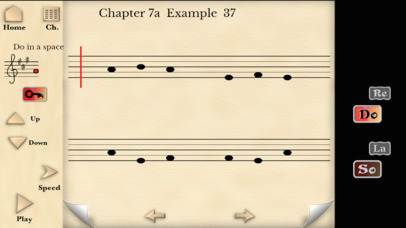
A sight singing app based on the degrees of the scale (Do Re Mi So La Ti Do). Singers who use this system are more likely to sing in tune, and dont need 5 years music theory or lessons in an instrument to be able to read in any key! It is a more musical way to sight-sing than trying to calculate intervals.
From beginner to intermediate, this app teaches the main notes of the major and minor scales, and explains why some notes are more difficult to find than others. As thorough as a sight-reading textbook (but much cheaper!) this app has the huge advantage that you can hear and check your notes with a simple touch to the screen.
Select any voice for Treble, Bass and Tenor clefs. (Tenor as Treble an octave lower).
This special iPhone edition has one choice of sound (Piano) to reduce the size of the app.
This app is not a random tune generator! The examples are carefully graded to introduce concepts and common note groups in a sensible order that suits western classical music, tested in classrooms and every level of choir from beginner to experienced.
Each of the 108 exercises can be adjusted up or down, to practice recognizing the structure of the scale on different keynotes, or to suit the compass of your own voice. Touch any note at any time to hear it, or press play to hear the whole melody.
This app is especially aimed at:
-> those who sing in choirs but dont have enough piano knowledge to learn their own notes.
-> those who can find their notes on a piano, but want to be able to sight sing direct from the page.
Play any chapter over again, check in different keys - or sing the exercises backwards for extra practice.
Included are some advanced tools for adjusting temperament and microtuning - making this app more accurate than a piano or keyboard.
(This app uses the Kodaly/Curwen solfa syllables, but introduces the notes in an order that is more effective for standard major/minor repertoire. A later version will restrict the range of the exercises for very young children, but most young learners should be fine with a bit of encouragement)



